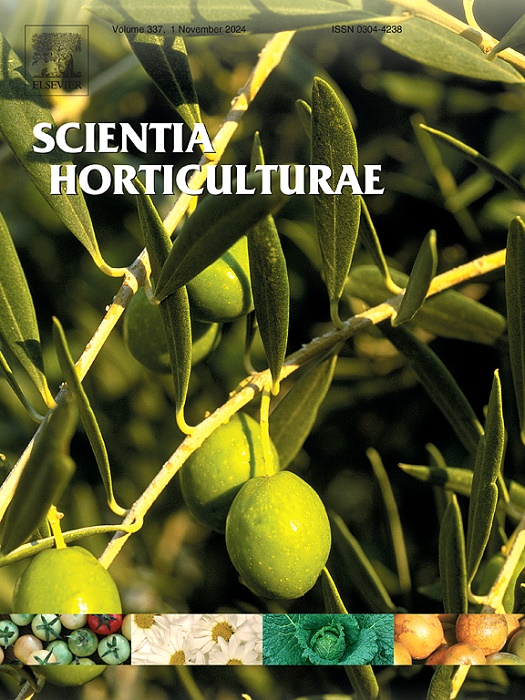A small heat shock protein (LhHSP17.9) in cut Lilium ‘Manissa’ flowers alleviates water-loss stress
IF 4.2
2区 农林科学
Q1 HORTICULTURE
引用次数: 0
Abstract
Small heat shock proteins (sHSPs) are important regulatory factors in plant growth, development, and response to stress. In this study, the regulatory mechanism of the novel lily LhHSP17.9 gene in water-loss stress was investigated by transient silencing and overexpression in Lily (Lilium ‘Manissa’) flower buds and transgenic Arabidopsis thaliana. Transient transformation of Arabidopsis protoplasts revealed that LhHSP17.9 was localized in mitochondria. Expression analysis showed that LhHSP17.9 was highly expressed in leaves, petals, and anthers. Water-loss stress induced the expression of LhHSP17.9, indicating that this gene is involved in the plant's response to dehydration. Under 5 % polyethylene glycol (PEG) 6000 treatment, Lily flowers with LhHSP17.9 - transient silencing exhibited a shorter vase life, higher malondialdehyde (MDA) content, lower activities of superoxide dismutase (SOD), catalase (CAT), and peroxidase (POD), and lower transcript levels of LhCu/ZnSOD, LhFeSOD, LhCAT, and LhPOD. In contrast, Lily petals transiently overexpressing LhHSP17.9 showed a delayed browning and reduced relative conductivity. Transgenic Arabidopsis seedlings subjected to mannitol stress had longer root lengths and most plants recovered when the transgenic plants were rehydrated after 15 days. Moreover, the relative expression level of the dehydration-responsive gene (AtDR22) was significantly increased under dehydration stress. In summary, LhHSP17.9 enhances the tolerance of Lily plants to dehydration, primarily by activating the expression of LhCu/ZnSOD, LhFeSOD, LhCAT, LhPOD, and AtDR22 genes.
百合切花中的一个小热休克蛋白(LhHSP17.9)减轻了水分流失压力
小热休克蛋白(sHSPs)是植物生长发育和逆境响应的重要调控因子。本研究通过在百合(Lilium ' Manissa ')花蕾和转基因拟南芥(Arabidopsis thaliana)中短暂沉默和过表达,研究了百合LhHSP17.9基因在失水胁迫中的调控机制。对拟南芥原生质体的瞬时转化表明,LhHSP17.9定位于线粒体。表达分析表明,LhHSP17.9在叶片、花瓣和花药中均有高表达。失水胁迫诱导了LhHSP17.9的表达,表明该基因参与了植物对脱水的反应。在5%聚乙二醇(PEG) 6000处理下,LhHSP17.9 -瞬间沉默百合的花瓶寿命较短,丙二醛(MDA)含量较高,超氧化物歧化酶(SOD)、过氧化氢酶(CAT)和过氧化物酶(POD)活性较低,LhCu/ZnSOD、LhFeSOD、LhCAT和LhPOD转录物水平较低。而瞬时过表达LhHSP17.9的百合花瓣则表现出褐变延迟和相对电导率降低的现象。经甘露醇胁迫的转基因拟南芥幼苗根长较长,15天后再水化后大部分植株恢复正常。此外,脱水反应基因AtDR22的相对表达量在脱水胁迫下显著升高。综上所述,LhHSP17.9主要通过激活LhCu/ZnSOD、lhesod、LhCAT、LhPOD和AtDR22基因的表达,增强了百合植物对脱水的耐受性。
本文章由计算机程序翻译,如有差异,请以英文原文为准。
求助全文
约1分钟内获得全文
求助全文
来源期刊

Scientia Horticulturae
农林科学-园艺
CiteScore
8.60
自引率
4.70%
发文量
796
审稿时长
47 days
期刊介绍:
Scientia Horticulturae is an international journal publishing research related to horticultural crops. Articles in the journal deal with open or protected production of vegetables, fruits, edible fungi and ornamentals under temperate, subtropical and tropical conditions. Papers in related areas (biochemistry, micropropagation, soil science, plant breeding, plant physiology, phytopathology, etc.) are considered, if they contain information of direct significance to horticulture. Papers on the technical aspects of horticulture (engineering, crop processing, storage, transport etc.) are accepted for publication only if they relate directly to the living product. In the case of plantation crops, those yielding a product that may be used fresh (e.g. tropical vegetables, citrus, bananas, and other fruits) will be considered, while those papers describing the processing of the product (e.g. rubber, tobacco, and quinine) will not. The scope of the journal includes all horticultural crops but does not include speciality crops such as, medicinal crops or forestry crops, such as bamboo. Basic molecular studies without any direct application in horticulture will not be considered for this journal.
 求助内容:
求助内容: 应助结果提醒方式:
应助结果提醒方式:


